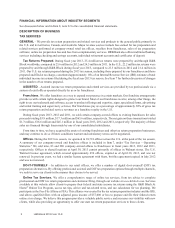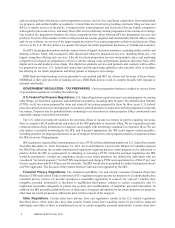HR Block 2013 Annual Report Download - page 19
Download and view the complete annual report
Please find page 19 of the 2013 HR Block annual report below. You can navigate through the pages in the report by either clicking on the pages listed below, or by using the keyword search tool below to find specific information within the annual report.12 H&R Block 2013 Form 10-K
We cannot make assurances that system or internet failures, or interruptions in critical business capabilities will not
occur, or if they do occur that we, our franchisees or the third parties on whom we rely will adequately address them.
The precautionary measures that we have implemented to avoid systems outages and to minimize the effects of any
data or communication systems interruptions may not be adequate, and we may not have anticipated or addressed all
of the potential events that could threaten or undermine our information systems or other critical business capability.
The occurrence of any systems or internet failure, or business interruption could negatively impact our ability to serve
our clients, which in turn could have a material adverse effect on our business and our consolidated financial position,
results of operations and cash flows.
Government initiatives that simplify tax return preparation or expedite refunds could reduce the need
for our services as a third-party tax return preparer, and cause our revenues or results of operations
to decline.
Many taxpayers seek assistance from paid tax return preparers such as us not only because of the level of complexity
involved in the tax return preparation and filing process, but also because of paid tax return preparers' ability to expedite
refund proceeds under certain circumstances. From time to time, the IRS or members of Congress propose measures
seeking to simplify the preparation and filing of federal tax returns, including preparation of tax returns directly by the
IRS, and to provide additional assistance with respect to preparing and filing such tax returns or expediting refunds.
H&R Block is a member of the FFA, which provides the ability for low-income taxpayers to prepare and file their own
tax return for free. The IRS has been exploring the Real Time Tax System concept, which would require that documents
(such as W-2s and 1099s) must be on file with the IRS prior to the taxpayer submitting their tax return. The objective
of this concept would be to facilitate document matching such that it would reduce fraud, and after the fact audits. The
implementation of the Real Time Tax System would provide the foundation for the IRS preparation of tax returns, and
thus, were it to come to fruition, makes the pre-populated return a more tangible possibility.
In the past, the U.S. Department of the Treasury completed a prepaid debit card pilot program designed to facilitate
the refund process. HRB Bank also provides this type of service through its H&R Block Prepaid Emerald MasterCard®.
Additionally, the IRS has in the past explored the possibility of allowing taxpayers to allocate a portion of their tax
refund to pay the tax preparation fees, which could reduce the demand for RACs. However, the IRS has not advanced
this initiative. Taxing authorities in foreign jurisdictions in which we operate, and various state and local taxing
authorities, have also introduced measures seeking to simplify the preparation and filing of tax returns in their respective
jurisdictions. The adoption or expansion of any measures that significantly simplify tax return preparation, expedite
refunds or otherwise reduce the need for a third-party tax return preparer could reduce demand for our services and
products and cause our revenues or results of operations to decline.
Proposed Federal Reserve capital requirements may restrict our capital allocation strategies and we
are therefore exploring alternatives to cease being an SLHC. If we were to cease being an SLHC, the
means we use to deliver financial services and products to our customers and the revenues and
profitability of those offerings could be adversely impacted.
Our subsidiary, HRB Bank, is a federal savings bank. Our Holding Companies are SLHCs because they control HRB
Bank.
The Dodd-Frank Act requires the Federal Reserve to promulgate minimum capital requirements for SLHCs,
including leverage and risk-based capital requirements that are no less stringent than those applicable to insured
depository institutions at the time the Dodd-Frank Act was enacted. On August 30, 2012, the Federal Reserve published
in the Federal Register a notice of proposed rulemaking on regulatory capital requirements, implementing changes
required by the Dodd-Frank Act and aspects of the Basel III regulatory capital reforms, portions of which would apply
to our Holding Companies (“Proposed Capital Rules”). The OCC, which regulates HRB Bank, and the FDIC joined
the Federal Reserve in requesting comments on the Proposed Capital Rules. The comment period expired on October
22, 2012. We provided formal comments on the Proposed Capital Rules. It is currently unclear what the regulatory
capital requirements for SLHCs will be and when such capital requirements will become effective. The Federal Reserve
announced on November 9, 2012 that the implementation would be postponed beyond January 1, 2013 to an unspecified
date. See Item 1, “Regulation and Supervision - Bank and Holding Companies,” for details of the proposed requirements.
The Federal Reserve Bank, the Company's primary banking regulator, has issued guidance set forth in Supervisory
Letter SR 09-4 (March 27, 2009) regarding the payment of dividends, stock redemptions and stock repurchases by
























